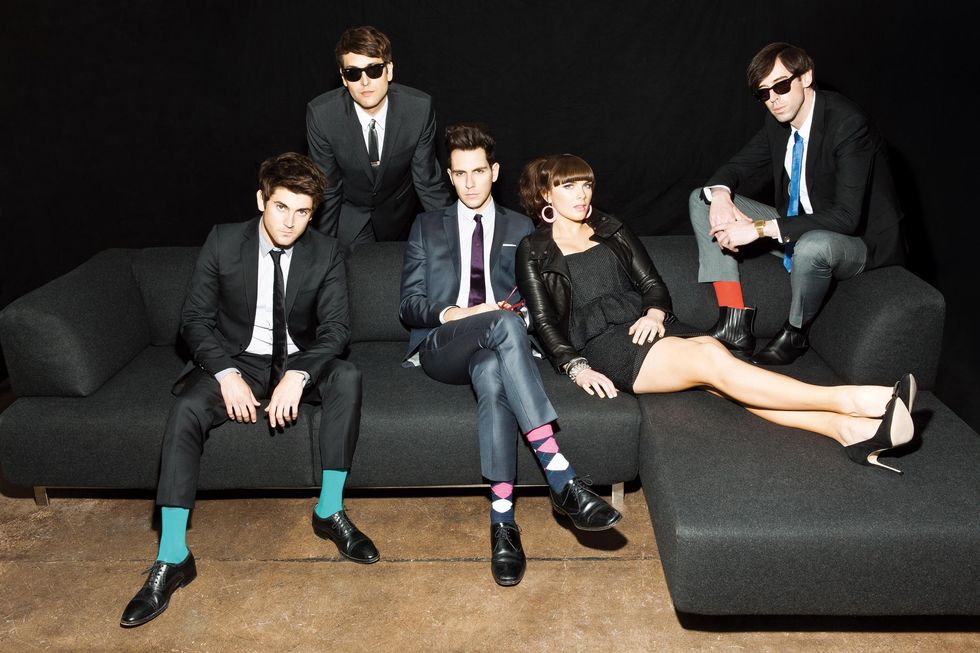
Nearly a century ago ago, T.S. Eliot wrote in The Wasteland that our world wouldn't end with a bang but a whimper, which doesn't seem too far off as we approach 2022 — but Cobra Starship's Gabe Saporta, now 42, has a different vision in mind for the future.
On Friday, December 17, Cobra Starship will reissue its multi-platinum breakthrough LP, Hot Mess, on limited edition silver vinyl — and pre-orders are available today. The release is part of Fueled By Ramen's 25th anniversary celebration that also coincides with the continued appeal of the album (Hot Mess was certified Gold last week).
The timing seems fated: in the mid-aughts, Saporta alleged he went on a "vision quest" in which a cobra from years ahead told him the apocalypse was approaching and it was his responsibility to throw a party. Thus, Cobra Starship was born in 2006 to deliver dancey dystopian anthems that famously include "Hot Mess" and "Good Girls Go Bad" with Leighton Meester.
Hot Mess' reissue looks back on this era of synth-driven pop-punk, featuring two previously unreleased bonus tracks written between 2011 and 2013. First up from the vault: "Beautiful Life," an equally upbeat and sentimental track that showcases Saporta surviving a time of struggle.
"It feels nice," Saporta says of the announcement, which includes a double A-side release titled Tracks to the Future. "Because it doesn't feel like there's any pressure. It just feels like, 'Hey, here are a couple of songs that were never released and we want to share them with you.'"
Beyond "Beautiful Life," there's also the more '80s-influenced "Party With You," which arrives on streaming platforms November 19. For this song, Saporta delivers a serious message: If society is finally reaching its grand finale, Cobra Starship wants to throw the last big get together — and everybody's invited.
Cobra Starship struck a chord with millennials during the Great Recession, when many (including myself) struggled with slim-to-no job prospects. Suddenly, the trajectory of doing well in school or being well-rounded did not yield the results we were all promised, and that created a dual sense of angst and ennui.
"It's that perspective that so many can relate to. Like, 'Hey, we're not really invited to that party, but our friend who's a bartender is going to sneak us in and we're going to try not to get kicked out.'"
The generation coming-of-age at the time of Cobra Starship's success (two Top 40 singles, appearances on Gossip Girl and SVU, 600 million global streams) could relate to feeling desperate to drown out their feelings. Economic obstacles during the mid-aughts — and now the pandemic — forced many to the edge while that tension created a desire for both escape and inclusion.
"I think it's that perspective that so many can relate to," Saporta says. "Like, 'Hey, we're not really invited to that party, but our friend who's a bartender is going to sneak us in and we're going to try not to get kicked out.'"
Saporta closed the book on Cobra Starship in 2015, after a whirlwind nine years of touring with everyone from Fall Out Boy to Justin Bieber. Today, he and his wife, fashion designer Erin Fethersten, live in LA where they raise a child together and Saporta works at his own management company, The Artist Group (TAG).

Photography: Kai Regan
But his mission under Cobra Starship isn't done just yet. Saporta says he went on a final "vision quest" before retiring, and the cobra foretold of a not-so-distant society in the nadir of "high cultural and political division." Survival was unclear, according to the cobra, but the need for Cobra Starship remained.
"Cobra Starship started right after the big recession in 2007 and we thought there was a lot of stress in the world at that time — that things were changing rapidly and we didn't know how to make sense of the world," Saporta says. "And I think the world is in a similar place today. Unfortunately, maybe a little bit worse."
Rather than a comeback, consider Hot Mess' reissue a celebration — a welcome home to an angsty audience who just wants to dance. If mid-aughts fans connected to Cobra Starship's bangers expressing the restlessness of entering adulthood amidst turmoil, it makes sense why they'd still identify with that music while experiencing similar frustrations — especially post-pandemic.
"The whole storyline [of Tracks to the Future] is that we went to the future then came back to deliver the songs because the world is in a place where it might be about to end and we need some respite," Saporta says. "We're having a good time, but we're having a good time because we need a break, so there's that recognition of how hard it is."
Photography: Jimmy Fontaine (Courtesy of Gabe Saporta)
Related Articles Around the Web